|
|
|
Sort Order |
|
|
|
Items / Page
|
|
|
|
|
|
|
| Srl | Item |
| 1 |
ID:
158867
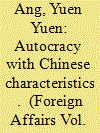

|
|
|
|
|
| Summary/Abstract |
Sooner or later this economy will slow,” the New York Times columnist Thomas Friedman declared of China [1] in 1998. He continued: “That’s when China will need a government that is legitimate. . . . When China’s 900 million villagers get phones, and start calling each other, this will inevitably become a more open country.” At the time, just a few years after the fall of the Soviet Union, Friedman’s certainty was broadly shared. China’s economic ascent under authoritarian rule could not last; eventually, and inescapably, further economic development would bring about democratization.
|
|
|
|
|
|
|
|
|
|
|
|
|
|
|
|
| 2 |
ID:
113702
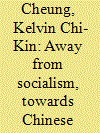

|
|
|
|
|
| Publication |
2012.
|
| Summary/Abstract |
Following the success of China's economic reform in the past few decades, Chinese nationalism has entered a new stage. The sentiment born of 'the century of national humiliation' is insufficient to explain the phenomenon of Chinese new nationalism. In this new era, China no longer regards the West as the benchmark against which it defines its success, but is becoming more assertive about its own values and perspectives. This emphasis on a Chinese perspective is related to the cultural shift in China's post-socialist transition, where the source of legitimacy in China's development has moved from an ideological dimension of socialism to a cultural dimension of 'Chinese characteristics'. Following this transition, growing importance is being placed on an indigenous voice in many aspects of China's development, including the recent efforts to reinvent traditional Chinese culture as a source of China's soft power. In particular, with strong state sponsorship, Confucianism is being revived as a new nationalist discourse, which not only provides new discursive resources for continuing authoritarianism in mainland China, but also redefines governance and nation-building with respect to Hong Kong and Taiwan.
|
|
|
|
|
|
|
|
|
|
|
|
|
|
|
|
| 3 |
ID:
186138
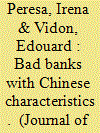

|
|
|
|
|
| Summary/Abstract |
This article analyzes the experience of four asset management companies (AMCs) or ʽbad banks’ established in China in 1999 to address a systemic build-up of non-performing loans (NPLs). It describes the modalities of NPL transfers across several rounds of government interventions. It explains the AMCs evolving asset structure, funding and operations, with particular focus on a significant change in their business model. Overall, AMCs have helped stabilize the Chinese financial sector, albeit at a substantial fiscal cost. While they became permanent features of the financial system, the expansion of non-core activities has reduced their ability to perform their original function and generated additional systemic risk. Recent developments point to a renewed role, although a deeper reform of the NPL market will also be needed.
|
|
|
|
|
|
|
|
|
|
|
|
|
|
|
|
| 4 |
ID:
148393
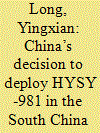

|
|
|
|
|
| Summary/Abstract |
This article sheds light on developing a hybrid analytical construct by combining Foreign Policy Analysis (FPA) theory and modifications tailored to the case of China. It employs the bureaucratic politics model to China’s decision making during the China–Vietnam standoff in 2014 and adjusts the traditional model with intervening variable – the party ranking system and Democratic Centralism doctrine. I argue that the bargaining game among different actors who have diverse agendas led to the shift in China’s strategy. It would concurrently advance FPA studies while developing a future avenue for research on foreign policy formulation of China.
|
|
|
|
|
|
|
|
|
|
|
|
|
|
|
|
| 5 |
ID:
104014


|
|
|
|
|
| Publication |
2010.
|
| Summary/Abstract |
This is an introduction to the core ideas of the book Construction of the Chinese Communist Party in a Global Context. By relating to his own experiences and understanding on Party construction, the author has made a succinct summary of the book as follows: the analysis of the causes of the collapse of the Soviet Union; the understandings of "faith", "the key to managing well China's affairs lies with the Party", the importance of learning, and the emphasis on the quality of Party members. The article can help the international community have a comprehensive understanding of the constant efforts of the Communist Party of China to improve itself and China's political system of socialism with Chinese characteristics.
|
|
|
|
|
|
|
|
|
|
|
|
|
|
|
|
| 6 |
ID:
132993
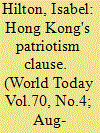

|
|
|
|
|
| Publication |
2014.
|
| Summary/Abstract |
It is the first such paper the Chinese government has produced since the 1997 handover, and its critics see it as a unilateral re-framing by China of the concept of One Country, Two systems, the late Deng Xiaoping's formula for the co-existence of Hong Kong's capitalism with Beijing's socialism with Chinese characteristics.
|
|
|
|
|
|
|
|
|
|
|
|
|
|
|
|
| 7 |
ID:
085850
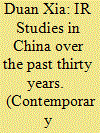

|
|
|
|
|
| Publication |
2009.
|
| Summary/Abstract |
In this paper, the author has systematically summed up the
history and current status of international relation theory studies in
China. The call for build international relation theory with Chinese charateristics is also introduced and analyzed.
|
|
|
|
|
|
|
|
|
|
|
|
|
|
|
|
| 8 |
ID:
165607
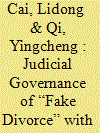

|
|
|
|
|
| Summary/Abstract |
“Fake divorce” is a phenomenon unique to China that re�ects the di�-
culty of harmonizing the social governance model under traditional
familism ( 家戶主義 jiahuzhuyi) with the trend toward individualization during Chinese society’s transition from a planned to a market
economy. �at di�culty and the absence of regulatory rules leave room
for the Chinese courts to innovatively interpret prevailing laws/regulations and create judicial rules by exercising their own discretion. By
analyzing the role the courts have played in adjudicating fake-divorcerelated disputes as well as the relationship between the judicial system
and overall political system, this article reveals their role in modernizing Chinese society during the transition period. It argues that
although judicial power remains embedded in the sociopolitical system,
the courts are to a certain extent so�ening the contradiction between
rigid policies and practical realities through the innovative exercise of
judicial rationality. In sum, the general approach adopted by the
Chinese courts in dealing with fake divorce disputes represents a
rational choice based on the exercise of limited judicial resources and
measures rather than a mechanical application of laws or rigid implementation of government policies and goals.
|
|
|
|
|
|
|
|
|
|
|
|
|
|
|
|
| 9 |
ID:
088456
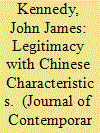

|
|
|
|
|
| Publication |
2009.
|
| Summary/Abstract |
Over the last 20 years, an increasing number of villagers have experienced free and fair elections, and this has contributed to the legitimacy of local democratic practices as well as the authoritarian regime. Yet, these improvements in election procedures can only occur when township officials are removed from the village leader selection process. As a result, the increase in regime legitimacy is closely tied to reduction in the authority of mid-level officials to directly select subordinates. This process, where it has occurred, has generated a bottom-up institutionalization of democratic practices, and suggests that researchers should not dismiss the importance of election procedures too quickly.
|
|
|
|
|
|
|
|
|
|
|
|
|
|
|
|
| 10 |
ID:
156369
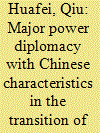

|
|
|
|
|
| Summary/Abstract |
China's foreign relations present a new vision, idea and strategy under the leadership of Presidnet Xi Jinping. The article explains the performance of international relations in current transition order and tries to tackle prior (and in some ways more intractable) issue and analyze the internal logics and external environment of impact of multi-polarization on China's major power diploamcy with its characteristics in the tranistion of international order.
|
|
|
|
|
|
|
|
|
|
|
|
|
|
|
|
| 11 |
ID:
161196
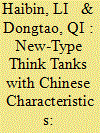

|
|
|
| 12 |
ID:
174777
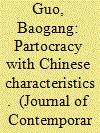

|
|
|
|
|
| Summary/Abstract |
Regime resilience is a frequent theme in Chinese political research. This article examines China’s latest effort to enhance the regime’s political stability by modernizing its governance system. It argues that China’s current governance system reform has institutionalized the Chinese party-state and transformed it into a partocracy. Partocracy, as a new analytical model, can be very useful but is still underdeveloped. The case presented in this article will reveal some of the main features of the emerging Chinese partocracy. It shows that the governance system reform undertook by Xi Jinping has begun the process of institutionalizing, rationalizing, and legalizing the old party-state system. By examining these latest developments, the author hopes to stimulate more interest in the study of partocracy as an analytic model.
|
|
|
|
|
|
|
|
|
|
|
|
|
|
|
|
| 13 |
ID:
145192
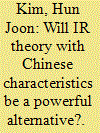

|
|
|
|
|
| Summary/Abstract |
The study of International Relations in China has dramatically increased over the past 30 years. Scholars have now developed a Chinese School(s) of International Relations theory, or at least, International Relations theory with ‘Chinese characteristics’. This recent Chinese move is neither new nor the first attempt, but located within larger efforts to move away from Anglo-Saxon dominance within the International Relations discipline by localizing International Relations theory. From this standpoint, although there seem to be more problems than promises in recent Chinese attempts, we still cannot ignore the great potential of this initiative, first because the pace of change is so fast, second because the number of scholars working on the topic is ever increasing, and last, because the rise of China brings more frequent interactions between Chinese and Western International Relations scholars. All these factors provide extremely fertile ground for any lucky, timely seed of Chinese International Relations theory to germinate, flourish, and proliferate.
|
|
|
|
|
|
|
|
|
|
|
|
|
|
|
|
|
|
|
|
|